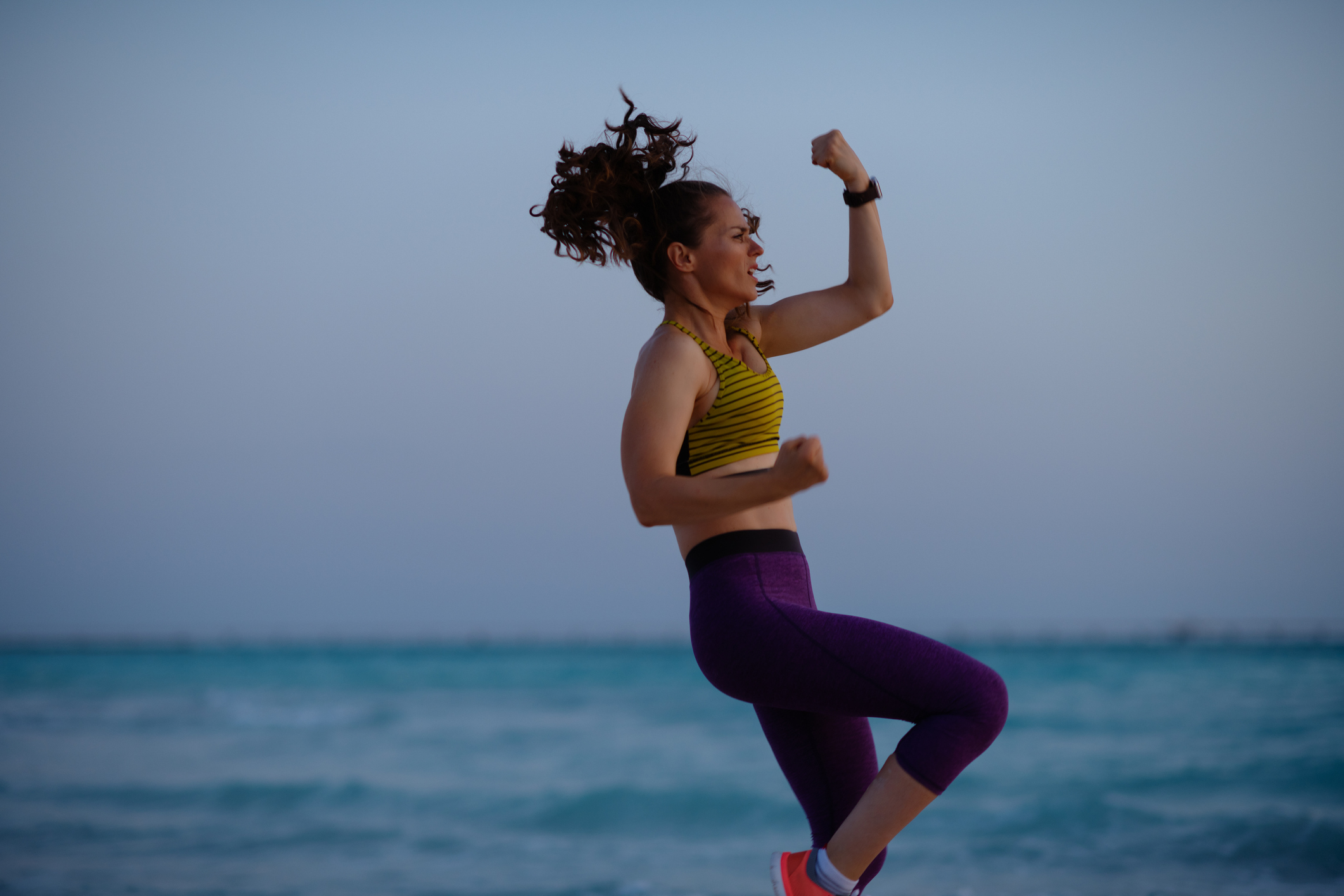You asked, we answered: so, when is the best time to workout?
Do mornings trump all or could evening be better for sleep?


Celebrity news, beauty, fashion advice, and fascinating features, delivered straight to your inbox!
You are now subscribed
Your newsletter sign-up was successful
Do mornings trump all or could evening be better for sleep?
If you're searching the internet for an answer to when is the best time to workout, you might just have started a new workout routine or, you're tired of dragging yourself out of bed in the morning if a lunchtime sweat sesh might actually reap more reward.
Question, then: is there even such thing as a best time to workout, or is it different for everyone? We've asked two qualified personal trainers to dissect what the science says on the matter, and conclude a time of day, once and for all.
Here, David Wiener, training specialist at Freeletics, and FIIT trainer Sean Kazab share their take. Don't miss our tried and tested guides to the best high waisted gym leggings, running shorts for women, and oversized gym t shirts, while you're here.
Trying to suss out what time of day to slot your sweat sessions in? Look no further.
You asked, we answered: when is the best time to workout?
We bought you the answer to how long should a workout be - next up, some expert guidance on when. Should you go with the crowd and workout early doors, squeeze your session in midday, or opt for some evening movement, instead?
Wiener maintains that the most important thing when figuring out when to workout is to tailor it to your needs and requirements. If you're not a morning person, saying you'll workout at 7am will likely result in you skipping sessions altogether. That being said, if you're tired come 4pm or would rather head to the pub post-work, an evening session won't be for you.
"The most important thing is to workout whenever is best for you," he emphasises.
Kazab agrees, adding that whatever time of day you fit your session in, it's important to try and get some movement in every day. "It's been shown, time and time again, even small doses of daily activity can make a huge impact on someone's health."

Why does it vary from person to person?
Think about it: every individual has their own morning routine, daily itinerary, and ways of working, too. "This means that whatever time they exercise needs to work for them," he shares.
So what does the science say? In the evenings you have higher testosterone levels as well as a higher anaerobic capacity which can make you stronger, shares Wiener. "In fact, according to the Applied Physiology, Nutrition and Metabolism journal, anaerobic capacity is 7% higher in the evening compared to in the morning, helping you with strength training and power movements," he explains.
However, morning workouts could be seen as more efficient as they are a lot easier to commit to, and once it’s finished, it’s done for the day, he continues. "With working out in the morning, you can focus on your day ahead, whereas, in the evening once your day is done, many people may be too tired, making it difficult to find the motivation to workout."
Lunchtime is also great for boosting your energy levels and avoiding the dreaded 4pm slump.
Below, he weighs up the pros and cons of all three options.
When is the best time to workout? The science, weighed up
Pros of working out in the morning
1. Increased fat burn
Working out in the morning has many pros, shares Weiner. "Studies - like this 2018 one published in the American Journal of Physiology: Endocrinology and Metabolism journal - show that exercising before eating could lead to increased fat burn," he shares.
Some trainers would advise you to workout first thing in the morning before eating breakfast, otherwise known as a fasted workout. "Fasted workouts are believed to help with fat loss - as this British Journal of Nutrition study concludes - although eating prior to a workout can give you more energy, therefore improving your performance," he shares.
That said, it's important to consult a qualified nutritional professional about what to eat before or after a workout (or read our expert-led guide). For women, in particular, training fasted can be harmful, as dietician Renee McGregor talks about at length, so do make sure to do your research pre-trying.
2. Ticks a box
Look at it this way: by working out in the morning, you are free to get on with your day without the thought of having to fit in your exercise hanging over you. "There are also some psychological benefits as working out in the morning," shares Wiener. "Getting it done is also helpful for those who tend to talk themselves out of a workout after the pressures of a busy or stressful day."
3. Boosted mood and productivity
You'll all know that exercise releases endorphins. "This means if you work out in the morning, you could boost your mood for the day," shares Wiener. "Several studies, including this 2020 study published in the British Journal of Sports Medicine, show that endorphins make you more productive and also improve your brain's production of serotonin, which can help you to think more clearly and enhance focus."
4. Improved metabolism
Finally, a recent study conducted this year and published in the Cell Metabolism journal found that working out in the morning can kick start your metabolism, so you may even burn more calories during the day.
Furthermore, the findings indicated that people who trained in the morning tend to make healthier food choices for the rest of the day.
Cons of a morning workout:
1. Higher risk of injury
While this one isn't set in science, it's fairly common sense: if you've just got out of bed and jump into a high intensity interval training session, you'll likely not be warmed up.
"You will need to spend time warming up your body before you begin exercising," shares Wiener. "Your body may be stiff from just getting out of bed and, if you don’t give your muscles enough time to warm up, you risk causing yourself an injury."
2. It's the morning
Need we say more? If you're not a morning person, waking up earlier than normal to get a sweat on will likely sound like a form of torture.
Wiener's top tips for making sure you get up? Get an early night - or workout at lunch or in the evening instead.

Pros of working out midday
1. Cya, afternoon slump
Did you know? Working out in the afternoon has been found to help combat that afternoon slump and actually make you feel more energised and awake, shares the trainer. One 2011 study found that those who worked out "showed significant increases in self-rated productivity, that is, increased quantity of work and work-ability and decreased sickness absence."
2. Adequate recovery time
Similarly, several studies - including this 2017 paper published in the Journal of Strength and Conditioning Research - have shown that working out in the afternoon could be the ideal time in terms of workout recovery and performance, too. "Your body will have a faster reaction time, cardio efficiency, and maximum muscle strength," shares Weiner.
Cons of working out midday:
1. You may be short on time
This one's obvious, but important. "If you're in a massive rush to get back to your desk, you may not be able to fully focus on your session," shares Weiner.
2. It may interfere with lunch timing
Remember, if you're planning to workout during your lunch break - you need to eat. "If you decide to work out in the afternoon, it's important to trial and error whether to do your session pre or post food," advises the trainer.
Again, referring to a qualified sports dietician or nutritionist will be your best port of call for working this out.

Pros of working out in the evening:
1. You may have more energy
Did you know? Research like this 2013 paper has shown that the average person should be able to exercise for at least 20% longer in the evenings, shares Wiener.
2. You may sleep better
A lot of people think that working out in the evening will disturb your sleep, but did you know? Studies have found that that participating in exercise in the evening will benefit sleep and aid quicker muscle recovery, shares the PT.
Take this 2015 meta-analysis into the link between late night exercise and sleep, which concluded that regular exercise has beneficial effects on total sleep time, efficiency, and quality.
3. You may perform better
Data has indicated that evening sessions can lead to both greater endurance and improved anaerobic performance, too, shares the PT.
Cons of working out in the evening:
1. You may be tired
Sounds obvious, but think about it - after a long day at work, will you really be up for an hour or so long sweat session? Be honest with yourself and book something in in the morning or at lunch if the evening just realistically isn't for you.
2. You may be less consistent
One 2019 piece of research found that, interestingly, people who work out in the morning are more likely to stay consistent rather than people who work out in the evening, shares Wiener.

So there you have it - your answer to when is the best time of day to workout.
Celebrity news, beauty, fashion advice, and fascinating features, delivered straight to your inbox!

Ally is Marie Claire UK's Senior Health and Sustainability Editor, a well-regarded wellness expert, ten-time marathoner, and Boston Qualifying runner.
Utilising her impressive skillset and exceptional quality of writing, she pens investigative, review and first-person pieces that consistently demonstrate flair and originality.
As well as writing, Ally manages a team of freelancers, oversees all commissioning and strategy for her pillars, and spearheads the brand's annual Women in Sport covers, interviewing and shooting the likes of Mary Earps, Millie Bright, and Ilona Maher. Shortlisted for three BSMEs and winning one in 2022, Ally lives and breathes her verticals: her eye for a story and connections within the wellness sphere are unrivalled. Follow Ally on Instagram for more.